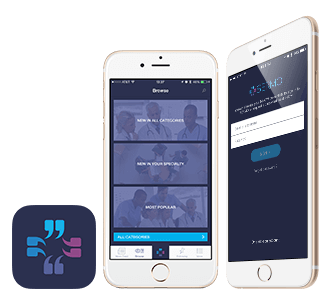Boston, Mass. (September 29, 2016) — Rocket Farm Studios was named a top 10 iPad app developer by Top App Creators.
Month: September 2016
So, if you don’t know where to get started with a blueprint for your app, Rocket Farm Studios can take the pressure off.
Why Can’t Google Get Messaging Right?
Google Allo is the company’s 3rd, 4th, or maybe 6th attempt at a messaging platform for Android users… depending on how you’re counting. The history of Google’s attempts in messaging is almost as complicated as Google Wave was. Remember Google Wave (aka Apache Wave now)? That was Allo back before apps ruled the world. It failed, just like Allo probably will.

So why can’t Google get it right? After all, a lot of their competitors have already done it. Facebook Messenger, Apple’s iMessage, WhatsApp, even Twitter DMs; all these platforms have evolved and gotten better with new features and updates, and yet here’s Google launching another messaging instead of iterating on what they have. Let’s pick apart the bad decisions Google has made on the way to it’s latest messaging app.
1. Google can’t recognize a good thing going (ie. Hangouts).
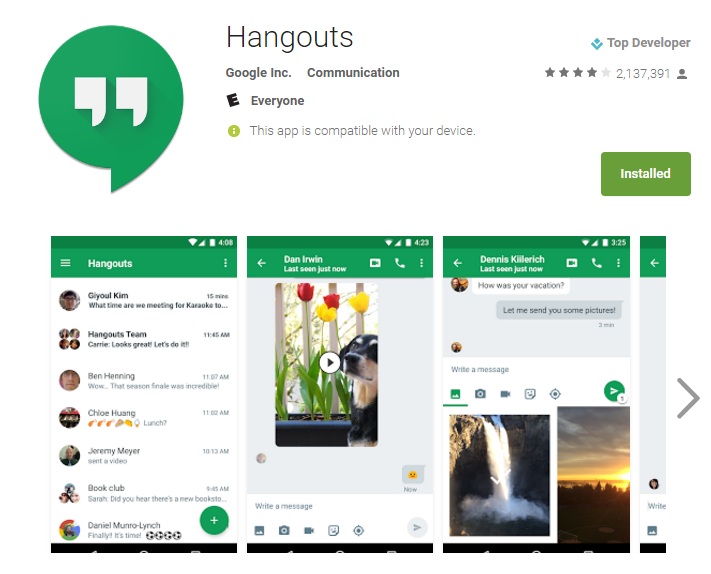 Google Hangouts is great. Before Allo and Duo, it was both of those things and more, and it still is since it’s still currently available and still being updated. It has a 4-star rating on the Google Play store from millions of reviews and billions of downloads.
Google Hangouts is great. Before Allo and Duo, it was both of those things and more, and it still is since it’s still currently available and still being updated. It has a 4-star rating on the Google Play store from millions of reviews and billions of downloads.
It sends chat messages, text messages (something Allo can’t do), images, pictures, stickers, and has a popular video chat component that it’s best known for. In the same app! A novel idea, now that you need both Allo and Duo. Google’s obviously trying to win over the iPhone crowd who is used to two apps (iMessage and Facetime), but Android users are already used to a combined app. As The Verge put it, this is a big step backwards.
We’re not alone in thinking this way. Plenty of Android advocates are telling users not to switch from Hangouts to Allo. Again, Allo doesn’t have SMS support, which is a huge deal. But there’s more (or less, we suppose): no desktop support, no browser extension support, no Gmail integration, no Google Voice integration. Basically, if Hangouts is MS Office, Allo is just Word.
2. Google doesn’t understand what its users want.
Google’s goal with Allo is to make messaging simple and powerful. Hangouts, granted, is a bit tricky to use for newbies. There are a lot of features to dig into. Allo is dead simple, but in the way a knife is simple compared to a Swiss Army Knife: there’s only one thing you can do with it. Sure, Allo comes with Google’s AI chatbot, which is the shiny new toy designed to make users download the app. It’s fine. We’ve all seen it before when it was called “Google Now.”
Google doesn’t seem to understand the one thing Android users ask for over and over again: consistency. All the major complaints of Android can be distilled into that. Users complain about OS fragmentation because it’s not consistent. Users complain about Android flagship hardware: is it Nexus or Pixel, make up your mind! With messaging, it’s a huge pain to have to switch platforms every few years. Simply improving on the current app would be more consistent.
So if Hangouts was difficult to use, why didn’t it get a UX refresh? Why not bring Duo’s fun “knock knock” feature to Hangouts as well? At the very least, why not integrate the new AI chatbot into the messaging platform that tens of millions already use? At the end of the day, users don’t want to constantly download and learn new apps. Users want new features in the apps they already have. Facebook Messenger has added new features over the years to its one app, so we know it’s possible!
3. Google loves to reinvent the wheel.
It’s as if Google is just so big now, the left hand doesn’t know what the right is doing, and thus different teams keep coming up with the same products. There’s Hangouts and Allo/Duo, but also don’t forget Google Messenger (that just does SMS texting). Then there are two social networks: Google+ and Google Spaces. There’s Google Voice to make WiFi calls, but there’s also Hangouts Dialer, but you can do it from within Hangouts as well. There’s a Gmail app and and Inbox app. There’s even Chrome and also a built-in Android web browser. The mentality seems to be “well this app will be better!”

Source: xkcd.com
So here we are, with 2 (or 3 or 6) messaging apps from Google that have fragmented Android users as much as the OS. We hope Allo fails if only to help Google learn that creating a new competing app for a weary audience isn’t how to win them over, but it’s doubtful it’ll learn the lesson. That is until its users give up on Google messaging apps altogether and flock to Facebook or WhatsApp. All we know is this: the Messaging War is heating up, and Google is shooting itself in the foot.
What do you think of Google Allo?
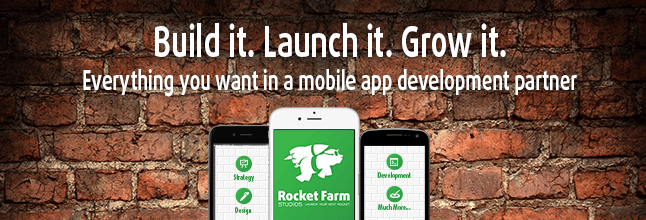
So, if you don’t know where to get started with a blueprint for your app, Rocket Farm Studios can take the pressure off.
One App to Rule Them All (A Horror Story)
Let’s lay out some mobile app facts and see where they lead us:
1. Most people only use a few apps.
According to comScore’s 2016 US Mobile App Report, 49% of smartphone users downloaded no new apps in the last month. The data points to most people just using the same apps over and over again. Which apps? You can probably guess most of the top 25:
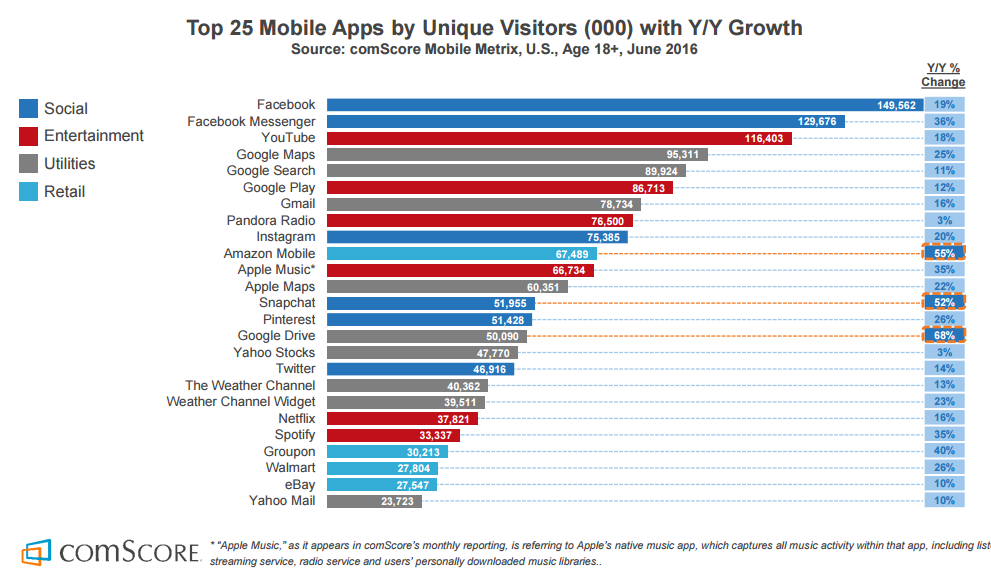
2. Bots are skyrocketing in popularity.
A recent report from Citigroup Inc. shows that the “bot economy” is growing faster than the app economy ever did. The general user barely even understands what bots are, or what they can really do, but they are booming. In 6 months of operating, we’re seeing significantly more bots than we did apps at their 6 month mark.
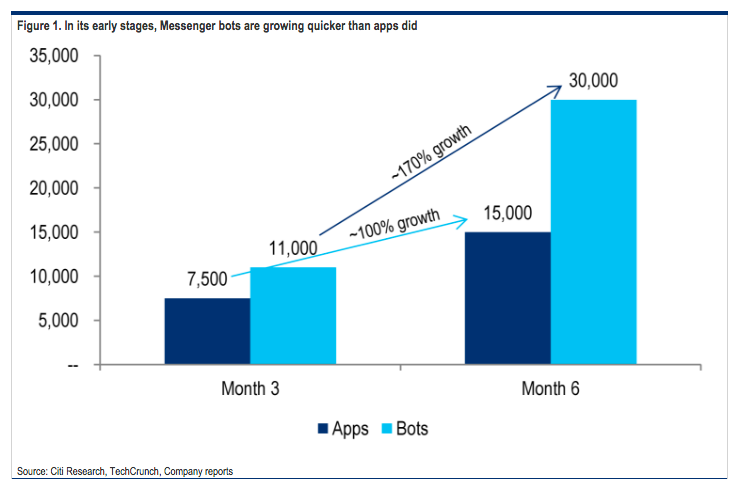
In a nutshell, bots are simple AI that usually plug into messaging app/platforms to help the user with tasks or transactions. Did you know you can hail an Uber via Facebook Messenger? That’s because of the Uber bot that plugs into the app.
Granted, bots need apps to thrive so it’s a bit skewed to compare growth rates, but the numbers indicate that bots might be the next big horizon of tech growth, especially if app growth has stagnated (as hinted at in our first point above). And users are getting more and more comfortable with these bots. Again, take Facebook Messenger. In it, you can:
- get an Uber
- send/receive money
- play games
- draw pictures
- edit photos
- buy real flowers
- get the news
- and much more.
With functionality like this, why would you need to download any app other than Messenger? Well, that’s exactly the point.
3. Tech giants are trying to lock users into their apps.
Google, Apple, Facebook. These are the three tech giants that are leading the charge in siloing app users. Check out the top 25 apps again: the big three account for nearly half of those (especially near the top), and if you count Amazon, that’s the majority of the top 25 apps that, again, most people spend most of their time in.
TechCrunch identified this race to create the all-in-one-app, and though they focus their article on the OS war between Apple and Google, we think it goes beyond that classic battle. It’s really down to the app. More time spent in Google Now versus Facebook Messenger versus Apple Music means billions in revenue for the winner, and it’s not a stretch to imagine that there will actually be a winner. It’s already happening in China with WeChat, where a regular user returns to it 10+ times over the course of a day, to do anything from messaging to payments to getting a taxi.

The scary future of all-in-one-apps.
These three pieces of news point to a frightening future where mega-apps do everything, and only a few niche apps will exist to cater to niche groups. As app developers, this makes us squirm. But as users, this makes us worry about being locked-in to a single app from a single company. Sure, the market might be evolving to where bots will replace apps as the new frontier in individualistic tech, but remember, there are really only two choices for mobile OS (sorry Windows), and apps already have to funnel into these two silos. Now bots that silo into apps? How far does this rabbit hole descend?
This app-pocalypse won’t happen overnight, and there are plenty of companies with a vested interest in not letting 3 tech giants build a mega-app. But the warning signs are there. It will be interesting to see what happens if users unwittingly slip into all-in-one app complacency.
What do you think about all-in-one apps? Sound off in the comments below!

So, if you don’t know where to get started with a blueprint for your app, Rocket Farm Studios can take the pressure off.
3 Reasons to Start Taking Health Apps Seriously
So, when’s the last time you launched that step-tracker app on your smartphone? Sure, Google Fit has over 10 million downloads, but these ubiquitous health apps are like that treadmill you bought in 2006: mostly for show. Ok, maybe I’m projecting here.
Health apps are indeed popular downloads with over 165,000 available for iOS and Android as of last year. And according to a NYU Langone Medical Center survey in 2015, 58% of smartphone users have downloaded a health-related app. Surprisingly, of those that downloaded a health app, 65% reported opening it at least once a day. Impressive! But this is just the beginning. Here are 3 reasons why the mobile market should start taking health apps seriously.
1. Health apps are getting specific.
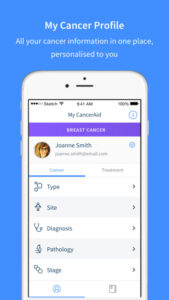 Self-advocacy in healthcare has always been important and people with similar ailments have always banded together for support and advice. Today, many health apps are not only making this easier, but also providing an accurate way of collecting important information. One example is CancerAid, which allows cancer patients to track symptoms, manage medications, track effectiveness of treatment, connect with others, and best of all, provide valuable data to their physicians.
Self-advocacy in healthcare has always been important and people with similar ailments have always banded together for support and advice. Today, many health apps are not only making this easier, but also providing an accurate way of collecting important information. One example is CancerAid, which allows cancer patients to track symptoms, manage medications, track effectiveness of treatment, connect with others, and best of all, provide valuable data to their physicians.
On the other side of the coin, some health apps cater specifically to doctors and physicians. SERMO, the leading social network for doctors, has created an app to facilitate research, collaboration, and consultation. Another example is Epocrates, a popular reference app that aids doctors in prescribing the right drugs to their patients.
Health apps that cater to a niche group and provide a real service will quickly become indispensable. As the market matures, we expect to see the rise of apps built around the needs of those that suffer from, and those that treat, specific ailments.
2. The FDA is getting involved.
It’s important that mobile leaders like Apple are trying to make sure that the health apps available to the public aren’t terrible. It’s not like a typo in Pokémon Go; a bad health app has the potential to cause real harm to people. So it’s great to see that not only is Apple providing the means to create great healthcare apps, it’s also monitoring the quality of apps that “could provide inaccurate data or information, or that could be used for diagnosing or treating patients.”
But more importantly, the US Food and Drug Administration (FDA) is taking more responsibility by setting guidelines for Mobile Medical Applications (MMAs). In fact, the FDA has published a list of examples of MMAs that it will regulate. Basically, if an app allows a mobile device to perform medical device functions, the FDA wants to make sure it’s safe to use.
The FDA isn’t perfect, but this is a big step in legitimizing the growing health app industry. Not only will apps be held to a higher standard, users will know that there’s a safety net built in. We wouldn’t be surprised if there is eventually an “FDA Seal of Approval” for the best health apps. Can’t get more official than that.
3. Baby Boomers are embracing health apps.
Over 75% of Baby Boomers have downloaded at least one mobile health app, according to a poll by Mitchell Research. More specifically, almost half of the Boomers surveyed said they would “download apps to monitor heart disease, diabetes or other chronic diseases;” and “would be most likely to trust a physician to recommend an app, even if the app wasn’t free.” That’s huge!

There are 75 million Baby Boomers, and even if just the younger ones embrace health apps, they are poised to be a giant segment of the population downloading (read: purchasing) these apps. Even putting the billions of dollars at stake aside, rapidly growing demand for a sector of technology is always a good thing for innovation. We are genuinely excited to see where the future of health apps is headed in light of their eager audience. After all, look how far computers have come due to public demand.
What do you think about the future of health apps? Sound off in the comments below.

So, if you don’t know where to get started with a blueprint for your app, Rocket Farm Studios can take the pressure off.
3 Takeaways From Recent Mobile App News
A lot of fascinating mobile app news has come out recently. Let’s take a look at the three that piqued our interest the most and what we’re taking away from them.
1. The Purge: App Store
For years, the number of apps in the Google Play store and the Apple App Store has been a source of bragging rights. But now that we’re more mature, we know that it’s really not quantity but quality of these apps that matter. For that reason, we applaud Apple’s decision to purge old and out-dated apps from its store (something it probably should have been doing for a while), even if it means they’ll no longer be able to tout having 2 million apps in their next iOS conference.
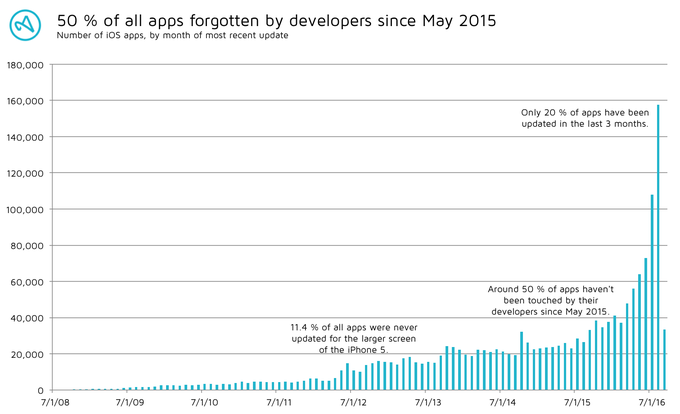
Source: TechCrunch
Some, like TechCrunch, are reporting that hundred of thousands of apps may be deleted in the Great App Purge since “50 percent of all apps have been abandoned by developers since May 2015.” While we don’t think it’ll be this drastic — a million apps disappearing would be a shock — it’s exciting to see that the apps that are continually being updated and improved will have less competition on iOS.
Takeaway: Updates matter. Regularly maintained apps will likely see a boost in traffic.
2. We’re 50% Apps Now
It’s finally happened: comScore.com has reported that 50% of all time spent on digital media now occur on apps. Here’s a pretty simple illustration of this trend:
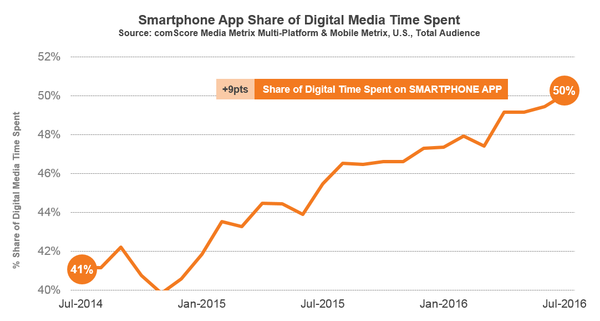
Great news for app developers right? Well not quite. comScore also reported that 8 out of 10 minutes spent in apps were allocated to a user’s favorite three apps. So this uptick in app time mostly means that a lot more people are spending time on Instagram.
But the trend is clear: we are an app-first digital society. Sure, businesses that aren’t Facebook might be competing for the 2 minutes of app-time remaining, but with billions of smartphones, that’s a lot of total time. What’s clear is that businesses from small to enterprise need to spend time and resources on improving apps above all else.
Takeaway: It’s not just “mobile-first,” it’s app-first by a long shot.
3. SMBs are App-Curious
This is pretty amazing: a new Intuit study shows that 66% of small-business app users are willing to “hire someone to train and educate them on the right apps for their business.” What caught our eye is that word “hire.” The thought that two-thirds of SMBs are willing to hire app experts is a clear indication that business are willing to put money on the line to get into the app race.
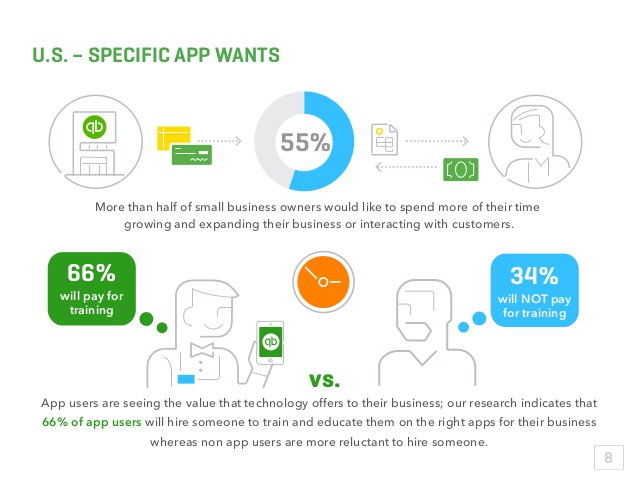
Source: Intuit
Since the 66% willing to spend money on app training are already app users, it shows that usage leads to an understanding of the real value of mobile apps. In fact, SMBs expect to save money by utilizing mobile solutions, so in the long run they fully expect (as they should) that investing in apps will ultimately lead to reduced costs and overhead. SMBs that are already used to apps know that there will be good ROI investing in apps.
Takeaway: Two-thirds of SMBs understand that apps are a solid business investment.

So, if you don’t know where to get started with a blueprint for your app, Rocket Farm Studios can take the pressure off.




